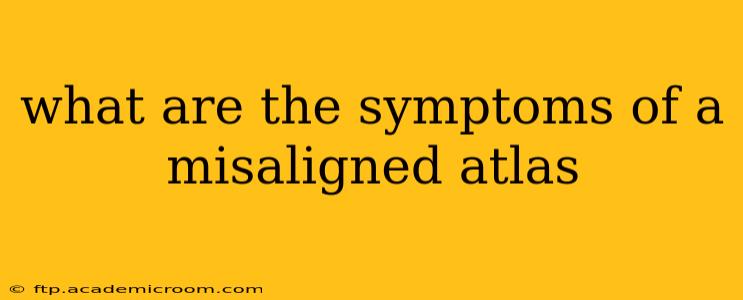The atlas, or C1 vertebra, is the topmost vertebra in your spine, supporting your head. A misalignment, often referred to as an atlas subluxation, can cause a wide array of symptoms, as this crucial bone plays a significant role in posture, nerve function, and overall body mechanics. It's crucial to remember that diagnosing an atlas misalignment requires a professional evaluation by a qualified healthcare practitioner, such as a chiropractor or osteopath. This article is for informational purposes only and should not be considered medical advice.
What is an Atlas Misalignment?
Before discussing symptoms, it's helpful to understand what constitutes an atlas misalignment. It's not simply a matter of the atlas being "out of place" in a dramatic way. Instead, even slight misalignments can disrupt the delicate balance of the head and neck. This can involve rotational misalignment, where the atlas is slightly twisted, or a lateral shift, where it's positioned slightly off-center. These subtle shifts can impact the surrounding muscles, ligaments, and nerves, leading to a cascade of potential problems.
Common Symptoms of an Atlas Misalignment
Symptoms of an atlas misalignment vary widely from person to person, depending on the severity of the misalignment and individual factors. Some people experience only minor discomfort, while others may suffer from debilitating pain and functional limitations. Here are some commonly reported symptoms:
Headaches:
Many people with an atlas misalignment experience persistent headaches, often described as tension headaches or migraines. This is because the misalignment can affect the flow of cerebrospinal fluid and irritate nerves in the neck and head. The headaches might be localized to a specific area or spread across the entire head.
Neck Pain:
Stiffness, pain, and limited range of motion in the neck are common complaints. This is due to the strain placed on the neck muscles and ligaments to compensate for the misalignment. The pain may be constant or intermittent.
Back Pain:
Surprisingly, an atlas misalignment can also contribute to back pain. This is because the misalignment affects the entire spinal column's alignment, leading to compensatory changes further down the spine.
Shoulder Pain:
Similar to back pain, shoulder pain can develop as a consequence of the body trying to compensate for the atlas misalignment. This can manifest as stiffness, aching, or even radiating pain down the arm.
Postural Issues:
A misaligned atlas can significantly impact posture. Individuals may experience forward head posture, rounded shoulders, or a noticeable asymmetry in their posture.
Dizziness and Vertigo:
Disruption to the balance mechanisms in the inner ear, potentially influenced by the atlas's proximity, can lead to dizziness and vertigo.
TMJ (Temporomandibular Joint) Problems:
The atlas's position directly influences the jaw and TMJ. A misalignment can exacerbate TMJ disorders, causing jaw pain, clicking, and limited jaw movement.
Fatigue:
Many individuals report increased fatigue and reduced energy levels associated with an atlas misalignment, potentially due to the body's constant effort to compensate for the misalignment.
Numbness and Tingling:
Nerve compression caused by the misalignment can lead to numbness or tingling sensations in the arms, hands, or other parts of the body.
Can an Atlas Misalignment Cause Other Problems? (Addressing PAAs)
This section will address some frequently asked questions regarding the potential wider implications of an atlas misalignment:
Can a misaligned atlas cause digestive problems?
While not a direct cause-and-effect relationship for everyone, some individuals report improvements in digestive issues after atlas correction. The theory lies in the impact on the nervous system, which influences various bodily functions, including digestion. However, digestive problems should be addressed by a gastroenterologist.
Can a misaligned atlas affect my breathing?
Similar to digestive issues, the nervous system connection plays a potential role. An atlas misalignment might indirectly affect breathing by impacting the rib cage's mobility and the muscles involved in respiration.
Does a misaligned atlas always cause symptoms?
No, many individuals with an atlas misalignment may not experience any noticeable symptoms. The presence of symptoms is highly individual and depends on several factors.
How is a misaligned atlas diagnosed?
A qualified healthcare practitioner, typically a chiropractor or osteopath, will use various assessment methods, including physical examinations, palpation, and sometimes imaging techniques like X-rays to diagnose an atlas misalignment. Self-diagnosis is not recommended.
What are the treatments for a misaligned atlas?
Treatment options vary but often involve gentle, specific adjustments by a trained professional aiming to restore the atlas to its proper position. Again, consult a qualified healthcare professional for appropriate treatment.
It is essential to reiterate that this information is for educational purposes only and should not be taken as medical advice. If you suspect you have an atlas misalignment or are experiencing any of the symptoms mentioned above, seek the advice of a qualified healthcare professional for accurate diagnosis and treatment. They can properly assess your condition and recommend the best course of action tailored to your individual needs.
